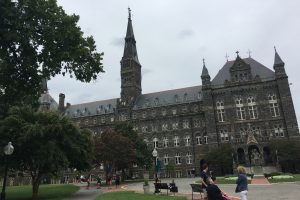Current and former students of 17 top universities, including Georgetown, who received financial aid may be entitled to cash claims from a settlement in a class action lawsuit accusing the schools of colluding to decrease financial aid paid to students. If the settlement is approved, Georgetown students who received financial aid that covered part of their expenses between Fall Semester 2003 and Feb. 28, 2024 would be entitled to settlement money, according to a court-directed notice, which was emailed to students on March 29.
The notice is the latest update in the class action lawsuit that accused the 17 universities of violating antitrust laws by using the same method to calculate financial aid. The lawsuit, filed in the United States District Court for the Northern District of Illinois, alleges that the universities’ collaboration caused them to deflate the amount of aid they would have given to students otherwise.
The universities attempted to initially dismiss the lawsuit in August 2022, but the motion was denied by Judge Matthew Kennelly.
Kennelly had preliminarily approved $284 million in settlements from some of the universities as of February 2024. The March 29 email notice announced the settlement’s proposed terms.
The money will go to the approximately 200,000 current and former students at the 17 universities who received need-based aid that covered part of their tuition during a period approved by the court, as well as to administrative costs and attorneys’ fees. Students from all of the 17 schools will be eligible to submit claims, even if their university, like Georgetown, has not agreed to settle.
Depending on if half of the eligible students submit claims, each will receive about $2,000 from the settlement, according to the notice. The universities agreed that any remaining money be donated to charitable causes that promote higher education access for disadvantaged students.
Collaboration on admissions standards is permitted by Section 568 of the Improving America’s Schools Act of 1994, as long as universities remain “need-blind” in admissions. The lawsuit alleges that the 17 universities were either not need-blind, or colluded with universities that weren’t.
Ten of the defendants – the University of Chicago, Emory University, Yale University, Brown University, Columbia University, Duke University, Dartmouth College, Rice University, Northwestern University, and Vanderbilt University – have agreed to settle, each paying anywhere from $13.5 to $55 million.
Georgetown still remains in the case and has not yet announced whether it plans to settle. The university does not comment on pending litigation, according to a university spokesperson.
The settlement distribution process will occur if the court approves the settlement at a Fairness Hearing on July 19, 2024. Eligible students can opt out or object to the settlement until May 13. Opting out would preserve a student’s ability to file an individual lawsuit against the universities later.
The settlements come amid the widespread observation that elite universities’ admissions process disproportionately favors the wealthy.
Federal investigators charged fifty people in Operation Varsity Blues, a college admissions bribery scheme where wealthy parents paid thousands of dollars in bribes to guarantee their children entry to elite universities between 2011 and 2018. Most recently, at Georgetown, students have launched a campaign for the university to end legacy admissions, arguing that these admissions favor wealthy applicants.
This is not the first time universities have been charged with colluding in their financial aid processes. In 1991, the Department of Justice charged the eight Ivy League universities and the Massachusetts Institute of Technology (MIT) for “illegally conspiring to restrain price competition on financial aid.” The Ivy League schools in the 1991 case signed a consent decree agreeing not to cooperate on financial aid again for 10 years, unless Congress allowed them to, though MIT fought the case in court.
If approved at the Fairness Hearing in July, the settlement for the unique antitrust lawsuit would be unprecedented for involving direct payments to current and former students.






